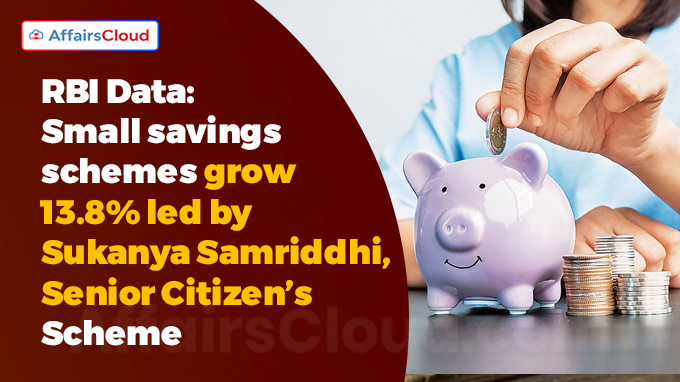 According to the Reserve Bank of India (RBI) data, small savings schemes grew by 13.8% up to February 2024, reaching Rs 18.1 lakh crore. These schemes, designed to finance government expenditure and promote saving habits, have shown consistent growth, particularly driven by the Sukanya Samriddhi Yojana (SSY) and the Senior Citizens Savings Scheme (SCSS).
According to the Reserve Bank of India (RBI) data, small savings schemes grew by 13.8% up to February 2024, reaching Rs 18.1 lakh crore. These schemes, designed to finance government expenditure and promote saving habits, have shown consistent growth, particularly driven by the Sukanya Samriddhi Yojana (SSY) and the Senior Citizens Savings Scheme (SCSS).
Key Points:
i.Seven small savings schemes, including Post Office Savings Scheme (PSS) and Post Office Recurring Deposits (PORD), recorded growth between 9% and 11%, with interest rates ranging from 4% to 9%.
- SSY and SCSS have seen the highest growth among all schemes.
ii.SSY saw a 41% growth, with the outstanding balance rising from Rs 77,472 crore in February 2023 to Rs 1 lakh crore in February 2024.
iii.SCSS recorded a 28% growth, with its outstanding balance rising from Rs 1.3 lakh crore to Rs 1.7 lakh crore during the same period.
iv.The outstanding balance of small savings schemes increased from Rs 6.2 lakh crore in 2015 to Rs 18.1 lakh crore in February 2024, with a 13.8% growth in February 2023.
v.Post Office Time Deposits(POTD), Monthly Income Scheme(MIS), and Kisan Vikas Patras(KVP) had the highest outstanding balances among all small savings schemes in February 2024.
vi.The ratio of outstanding small savings to outstanding deposits is at 11% in the Financial Year 2022-23(FY23), which was just 4.9% pre-pandemic.
About Small Savings Schemes:
i.Small Savings Schemes are savings instruments managed by the government to encourage citizens to save regularly.
ii.The small savings schemes have three categories- savings deposits, social security schemes, and monthly income plan.
iii.Interest rates for small savings schemes are notified on a quarterly basis by the government.
- The formula to arrive at the interest rates for small savings scheme was given by the Shyamala Gopinath Committee in January 2023.
Sukanya Samriddhi Yojana (SSY):
The Sukanya Samriddhi Yojana (SSY) was launched by Prime Minister(PM) Narendra Modi on January 22, 2015 as part of the Beti Bachao Beti Padhao (BBBP) campaign to promote girl child education.
- Eligibility:The SSY account can be opened at any Post office or branch of any authorized commercial banks. The girl child has to be below the age of 10 at the time of account opening.
- Interest Rate: 8.2% per annum for July–September 2024 quarter.
- Tenure: 21 years from the date of opening, or until the girl child marries after the age of 18.
- Investment: Minimum value is Rs.250 and Maximum value is Rs.1.5 lakh per annum
Senior Citizens Savings Scheme (SCSS):
The Senior Citizen Savings Scheme (SCSS) was launched in 2004 to provide retirement stability and a steady income.
- Eligibility: For individuals over 60 years of age.
- Interest Rate: 8.2% per annum for July–September 2024 quarter.
- Tenure: 5 years
- Investment:Minimum deposit is Rs.1000 and the maximum deposit is Rs.30 lakhs.
RBI increases Frequency of Reporting of Credit Information by lenders CICs
The RBI mandated the frequency of credit information reporting to fortnightly basis w.e.f. January 1, 2025 to boost transparency in the system. This move aims to enhance transparency and improve the credit reporting system, which is currently done monthly or at shorter intervals as agreed between credit institutions and Credit Information Companies (CICs).
- CICs must now process credit information from credit institutions within 5 calendar days, a reduction from the previous seven-day window.
Key Points:
i.CICs are required to submit a list of lenders not complying with the fortnightly reporting to the RBI’s Department of Supervision every 6 months.
ii.Borrowers will benefit from quicker updates of their repayment status, while lenders can make more informed risk assessments and help prevent borrower over-leveraging.
About CIC:
The Credit Information Company(CIC) is an independent institution that collects financial data regarding loans, credit cards and more about individuals and shares it with its members.The CICs are are licensed by the Reserve Bank of India(RBI) and governed by the Credit Information Companies Regulation Act, 2005.
There are four CICs in India:
- Credit Information Bureau (India) Limited (CIBIL)
- Equifax Credit Information Services Private Limited(ECIS)
- Experian Credit Information Company of India Private Limited(ECICIL)
- CRIF High Mark Credit Information Services Private Limited
Recent Related News:
i.On July 26, 2024, the Reserve Bank of India (RBI) released its ‘RBI Digital Payments Index (RBI-DPI)’ which stood at 445.5 at the end of March 2024, marking a 12.6% Year-on-Year (Y-o-Y) increase compared to March 2023 across all parameters. It was 418.77 in September 2023 and 395.57 in March 2023.
ii.On August 29, 2024, the Reserve Bank of India (RBI) launched a Scheme for Trading and Settlement of Sovereign Green Bonds (SGrBs) within India’s International Financial Services Centre (IFSC) in exercise of its powers conferred under Section 45W of the RBI Act, 1934 read with Section 45U of the Act and of all the powers enabling it in this behalf.
About Reserve Bank of India (RBI):
Governor – Shaktikanta Das
Establishment– 1st April 1935
Headquarters– Mumbai, Maharashtra




